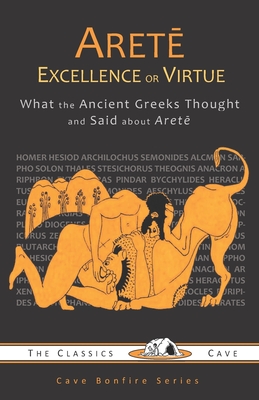Arete: Excellence or Virtue

Arete: Excellence or Virtue
ARETĒ EXCELLENCE OR VIRTUE is an anthology-like book that presents "what the ancient Greeks thought and said about aretē"-about "excellence" or "virtue." In Homer's ILIAD, Achilles' father urges him to "be the best" (to possess aretē, excellence or virtue). In the ODYSSEY, old Laertes rejoices that his son Odysseus and his grandson Telemachus are "battling over aretē." Hundreds of years later, the poet Theognis of Megara counselled his friend to "wear [himself] out for the sake of aretē." Still later, the philosopher Socrates spent time with anyone who would talk with him about what it meant to cultivate aretē. And that's only the beginning of an endeavor that lasted for well over a thousand years. That everyone in the ancient Greek world wanted to have and practice aretē is without doubt. It's what they hoped, prayed, and struggled for. It's what they admired and rewarded. The Spartan poet Tyrtaeus expressed the common view when he declared that aretē was the "best and noblest prize" one could win. Still, a question remains. As valuable as aretē was to them, what did the ancient Greeks mean by it? The goal of this book is to let them answer. After a brief introduction, ARETĒ EXCELLENCE OR VIRTUE presents what the ancient Greeks thought and said about aretē in their own words. We follow poets, playwrights, and historians on the what, who, and how of aretē. We listen to what all the major philosophers and schools of philosophy taught. And, finally, we hear selected passages from a number of orators that touch on aretē. No matter how you peruse what follows, you will likely find your own views on human excellence and virtue shift as the Greeks influence your thinking about and even pursuit of aretē. Plus, you will have an opportunity to practice aretē by following "A Plan of Life Aimed at Aretē" and engaging in the workbook or journal-like practice exercises found toward the end. More, in the glossary, you'll discover the Greek terms that are pertinent to aretē. Lastly, you'll be pointed in the direction of further resources and reading.
PRP: 100.36 Lei
Acesta este Pretul Recomandat de Producator. Pretul de vanzare al produsului este afisat mai jos.
90.32Lei
90.32Lei
100.36 LeiIndisponibil
Descrierea produsului
ARETĒ EXCELLENCE OR VIRTUE is an anthology-like book that presents "what the ancient Greeks thought and said about aretē"-about "excellence" or "virtue." In Homer's ILIAD, Achilles' father urges him to "be the best" (to possess aretē, excellence or virtue). In the ODYSSEY, old Laertes rejoices that his son Odysseus and his grandson Telemachus are "battling over aretē." Hundreds of years later, the poet Theognis of Megara counselled his friend to "wear [himself] out for the sake of aretē." Still later, the philosopher Socrates spent time with anyone who would talk with him about what it meant to cultivate aretē. And that's only the beginning of an endeavor that lasted for well over a thousand years. That everyone in the ancient Greek world wanted to have and practice aretē is without doubt. It's what they hoped, prayed, and struggled for. It's what they admired and rewarded. The Spartan poet Tyrtaeus expressed the common view when he declared that aretē was the "best and noblest prize" one could win. Still, a question remains. As valuable as aretē was to them, what did the ancient Greeks mean by it? The goal of this book is to let them answer. After a brief introduction, ARETĒ EXCELLENCE OR VIRTUE presents what the ancient Greeks thought and said about aretē in their own words. We follow poets, playwrights, and historians on the what, who, and how of aretē. We listen to what all the major philosophers and schools of philosophy taught. And, finally, we hear selected passages from a number of orators that touch on aretē. No matter how you peruse what follows, you will likely find your own views on human excellence and virtue shift as the Greeks influence your thinking about and even pursuit of aretē. Plus, you will have an opportunity to practice aretē by following "A Plan of Life Aimed at Aretē" and engaging in the workbook or journal-like practice exercises found toward the end. More, in the glossary, you'll discover the Greek terms that are pertinent to aretē. Lastly, you'll be pointed in the direction of further resources and reading.
Detaliile produsului








